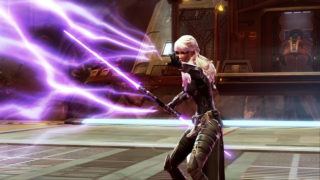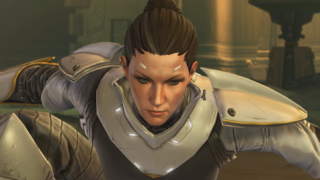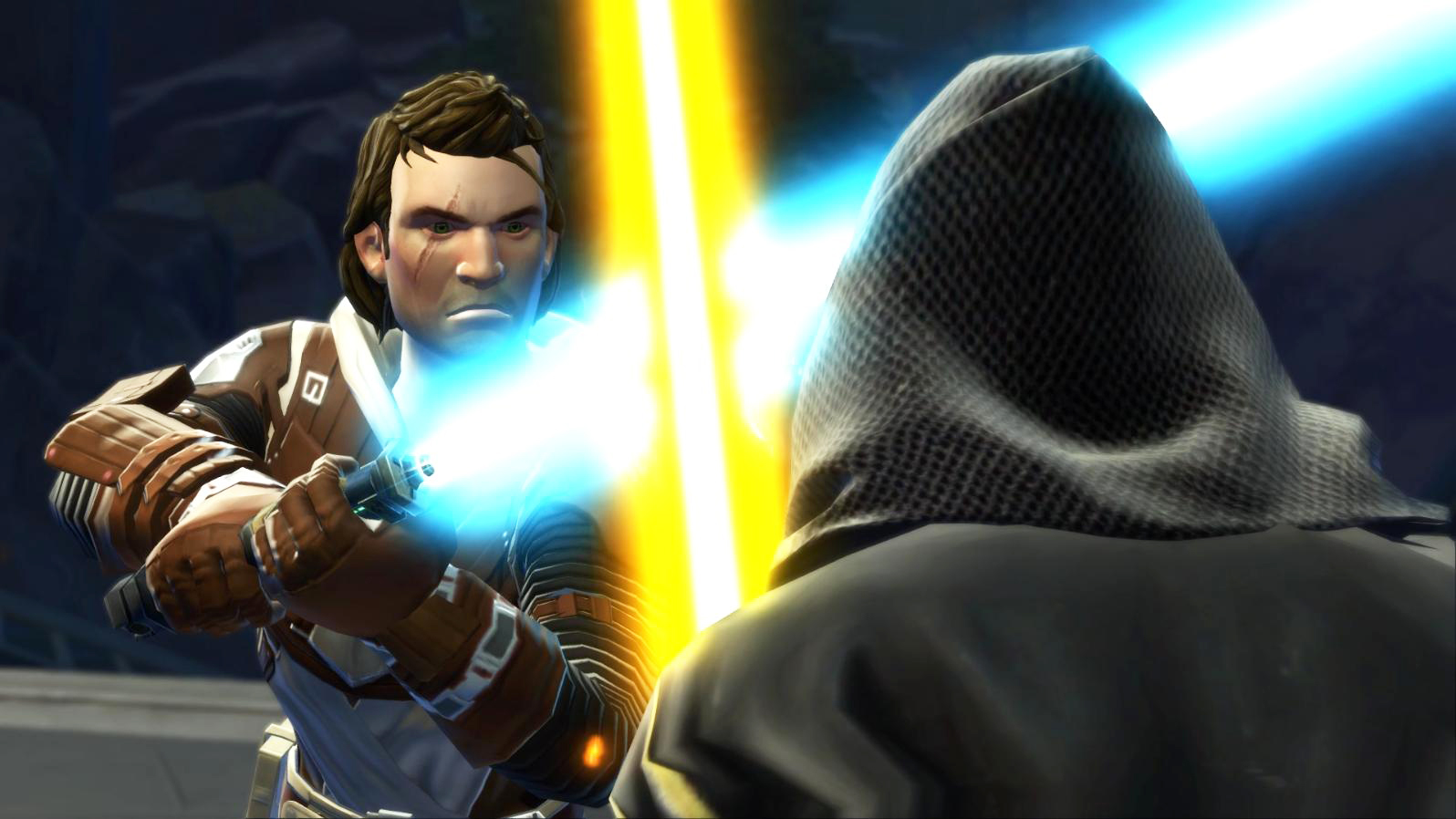Star Wars: The Old Republic (SWTOR) is a massively-multiplayer online role-playing game (MMORPG) that’s currently in its fifth year of operation. The free-to-play game (with optional subscription), which is developed by BioWare (Mass Effect; Dragon Age) and takes place in the golden age of Star Wars’ fictional history, launched its Knights of the Eternal Throne expansion last week. In it, players are referred to as “The Outlander,” and become deeply involved with the Royal Family of the Eternal Empire and its fate. Similar to last year’s hit, Knights of the Fallen Empire, the latest expansion includes nine chapters that emphasize Dark vs. Light Side decision making and themes of familial conflict.
The creative director for SWTOR, Charles Boyd, and lead producer, Ben Irving, recently spoke about launching the new expansion, how it compares to the last one, and what it will take to keep the game going for another five years.
Irving explained that last year’s Knights of the Fallen Empire expansion worked very well with nine epic story chapters. However, what didn’t work was the monthly schedule for each chapter, which was chalked up to how people like to consume entertainment these days, such as binge watching on Netflix. Players weren’t satisfied with getting one chapter a month. So, while the Eternal Throne chapters are deep and revolve around personal choices, there is an added focus on replayable multiplayer content to fill in the spaces between the big story beats.

Boyd also discussed the theme of family, which he describes as a core concept of Star Wars. “The original trilogy is all about the father, son and daughter relationship,” said Boyd. “It’s a family drama, which is very personable and very relatable. I think that’s what draws a lot of people into Star Wars. It’s an exciting space adventure; there are lasers, spaceships, strange aliens and all of that stuff, but it’s all grounded with very relatable conflicts and drama between the characters. There are probably no more relatable conflicts or personal drama than family, right? Everyone has some kind of family experience that they can relate to or have dealt with. I think that’s what makes Star Wars accessible, why that theme is so consistently used, and why we want to deploy it—because it’s so iconic to Star Wars.”
When asked whether the latest movies, such as The Force Awakens and the upcoming Rogue One had an impact on the game’s awareness and enthusiasm for the expansion, Irving told [a]listdaily:
“When Force Awakens came out, we saw a giant resurgence of Star Wars hype across the world. That certainly had a positive impact on Star Wars: The Old Republic as well. We saw a lot more interest in Star Wars, a resurgence in nostalgia, and when a lot of people think about Star Wars, they think about video games. They want a really deep, story driven, RPG-style game and that’s the exact kind of game that we’ve built.
“Rogue One hasn’t come out yet, and we hope that it’s a fantastic movie. All the previews suggest that it will be, and we think people are excited about that. We hope that people will continue to be excited about Star Wars, which is great for Star Wars: The Old Republic. If last year was any indication, that will be true.”
 As to whether or not the movies influenced the game’s content, Boyd said that “no matter how hard we try, we can never get any real details about the movies in advance. Lucasfilm is very tight-lipped about it, which is good because we go as a company to check out the movies and it’s fun to just walk in and have the same experience as the fans—with no pre-knowledge and experiencing it for the first time.
As to whether or not the movies influenced the game’s content, Boyd said that “no matter how hard we try, we can never get any real details about the movies in advance. Lucasfilm is very tight-lipped about it, which is good because we go as a company to check out the movies and it’s fun to just walk in and have the same experience as the fans—with no pre-knowledge and experiencing it for the first time.
“Given how we don’t have that secret insight into what’s happening in the film, we don’t really adjust for that. But certainly, we watch the previews like everyone else and get excited about the themes they’re exploring and the visual elements they’re introducing. We always look for ways to include that in our own stories.
“For example, in The Force Awakens, Kylo Ren’s lightsaber was awesome, and it was established that it was an ancient design from days long past, which happens to be the time period of our game! We were really excited by that; it was really cool to have the opportunity to introduce something new that fit perfectly into The Old Republic universe but also harkened to last year’s story.”
So, what’s the key to keeping an MMORPG engaging for over five years? Irving believes that it’s flexibility.
“The gaming industry changes significantly over a five-year period,” said Irving. “It’s a very mutable space, whether you’re building an online game, single-player game, strategy game, or shooter. You look at the industry and the feedback from people who are playing the games you made. I think we’ve been doing that, especially in the last couple of years. Look at Fallen Empire. The monthly chapters didn’t work out, but after you play the story, there’s highly repeatable content. So this year, our strategy is to have Galactic Command centered around providing longer-term engagement such as group activities and a focus on social. That’s all about retention and engagement. Of the lessons we’ve learned, the key is ultimately the flexibility to adapt to the industry and the environment.”
“We’re very fortunate to be on the type of game where we can do that,” Boyd added, “where we have regular updates, see what players are doing in real-time, get their feedback on different places, make changes and add new stuff.”

In speaking about how BioWare created dynamic content that involved Light vs. Dark Side decision making, Boyd said, “I think it comes down to thinking about real life and the experiences that you’re having. Although that’s not a realistic way to do things—people rarely think about whether they’re going to have cereal or granola as a Light Side or Dark Side decision—or even when people do things that we don’t like. Usually, their reasoning is not to be mean.
“Ultimately, you’re looking at what people do and adding a level of drama to it to coincide with the Star Wars philosophy. This is a universe where good and evil have a tangible and visual effect on people and the universe. Just like with the family theme, we’re looking at decisions that relate to our own lives and adding drama. This is a universe where making evil decisions makes you more evil. You look at it in that lens and try to make it relatable, but have that exciting and dramatic outcome you expect from a space opera like Star Wars.”

